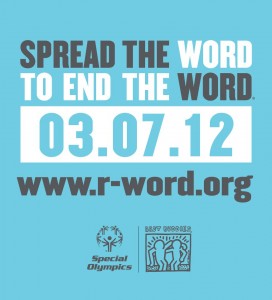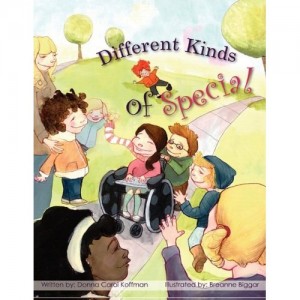To those who do not understand what the problem is with the “r-word”:
The r-word… retard. It’s a funny little slang word that can be used to describe so many things, situations…. people. It’s a word that’s causally thrown around, used without thinking about it… it doesn’t really mean anything.
Right?
Perhaps, if you do not have anyone in your family that has a disability or special need… it really doesn’t mean much to you. And so you don’t get it. Why do people make such a big deal about it? Why do so many people get so upset about a word that you don’t even give a second thought to?
Well, let’s fast forward a few years, actually, a lot of years and let’s say you’re now approaching your 80’s. You have children, grand children and loved ones beyond that. And then you have a stroke and in an instant… a large portion of your brain function is no longer available to you. You’re still smart, you still remember everything, you still love everyone… but now you struggle to say the things you’re thinking, you struggle to use your hands with precision…. you simply… struggle.
How would it feel if your children started calling you a retard? Your grandchildren? Ok, maybe not directly, but let’s put it this way…
One day you try to pick up a glass of water, it slips and crashes to the floor. A short while later in the day, you grandchild goes to pick up their plate, drops it and it smashes to the floor. Out of frustration, that grandchild says to themself: “Ugh, I’m such a retard sometimes!”
Ouch.
Perhaps that’s too far off, let’s put yourself a little closer to your present self as say… 20 years off from now, where you’re now a working and capable adult and your child has just been born into the world of limitless possibilities and wonder.
And then the doctor informs you that there have been complications. It’s nothing you did, it’s nothing they did… it’s just one of those things, right?
Something strange happens from that point on, where you begin to see your child as a determined fighter, a winner, an against all odds victor over anything that the world can throw at them and you love them so much more for it. It wasn’t one complication… it was a life long complication that has only made you and your child stronger.
Over time, you start to realize that the strange thing that I referred to earlier is actually that your perception is no longer that of your friends….
Where they still see a disability, you see strength.
Where they see failure, you see success.
Where they see retard… you see your child.
One day you try to get your child into a nice school in the neighborhood but they turn you away. They can’t accommodate your child and your child’s needs. Another parent is getting their child into the same school and asks why “that other parent and kid were turned away?”, the administrator tells them that your child has special needs and can’t be accepted. The kid, thinking you can’t hear, says “he wants to bring his disabled kid to this school? That’s retarded.”
Ouch.
The world hasn’t changed, you have. Now, instead of not giving that word a second thought… you do give it a second, third and fourth thought as it hurts you to the core.
It now means more to you than you ever thought it could… more than you ever thought it should.
And you speak up, and those kids don’t get you… they don’t understand why you’re making such a big deal about a word that they’ve never given a second thought and in that instant, you see yourself in those kids. You see what you were missing.
So perhaps it doesn’t matter right now, perhaps it’s just a funny silly little word… but some day it will hurt. It will hurt a lot.
Whether it’s you, your child, grand child, cousin… friend… it doesn’t matter. One day you’ll hear someone use that word and it will hit close to home and it will bother you. It will bother you a lot.
It’s not a funny silly little word. It’s a stereotype. It’s a label. It’s a knife in the heart. And not to a stranger… to someone close to you, maybe even yourself.
You didn’t even give it a second thought.
Click the image below to learn even more and to get involved… let’s help people to understand what it really means when you use the r-word.












